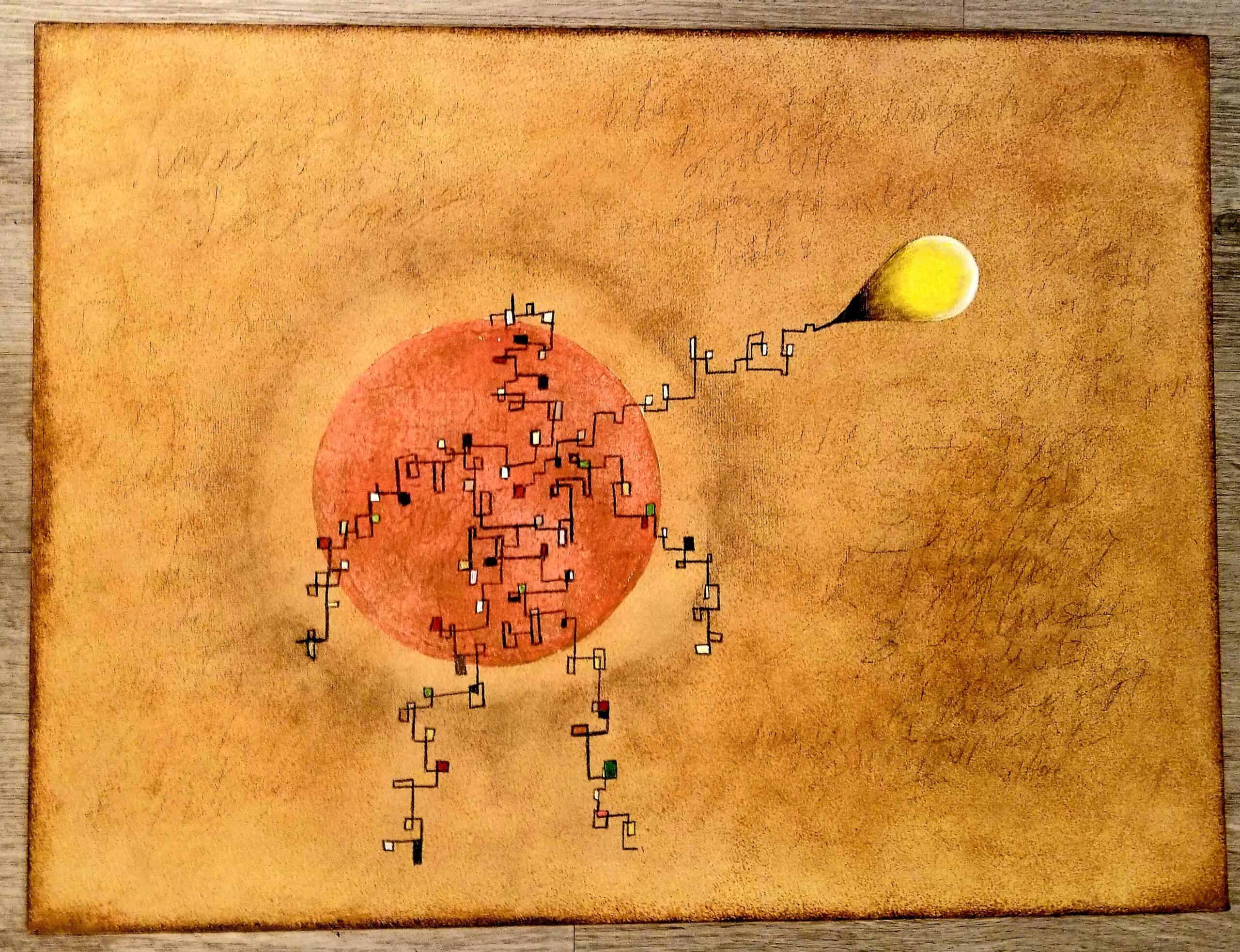Parts Work that Works – IFS (Internal Family Systems)

I feel like the word ‘obsessed’ is really overused these days. Like, just because you really enjoy cross-stitching or caramel lattes doesn’t mean that you are obsessed with them. So I’m not going to say that I’m obsessed with Internal Family Systems theory (IFS) lately. I’m just going to say that I’m incredibly, excitedly interested, and I’m learning all I can about it.
This is not really news for, well, pretty much anyone I’ve come into contact with in the last several months or so. It’s potential for healing and growth seems like an exponential shift, and it is solving problems in therapy that I have been searching for and thinking about for years.
I came across and read about IFS a few years ago, but I realize now that I didn’t really understand why this was a possible game-changer in therapy. Back then, I read about this theory of ‘having parts’ and it was like, so what? I wish someone had been able to better communicate to me what this is all about, so I’m going to try to do that here. My hope is that by explaining IFS and how I see it, my clients and friends and colleagues may be both more open to playing with these ideas and then likely more adept at using the model, since it will be better understood.
The Many Selves theory of Personality
IFS is a theory of mind and a way of working with it that might be quite different from what you have considered in the past. And might I suggest that this is also why it might be so vastly more effective! Essentially, IFS posits that the human personality is not monolithic (which is the old way of seeing things) but is a system of parts. Let’s be clearer: Who you are – your personality – is not really a singular self, but a system of selves that work together to give some semblance of (hopefully) coherence. And for most of us there is decent coherence – we know generally who Scott is, or will be, in many or most situations. However, many of us are much more diverse, and possibly less integrated. Meaning that Janice can seem like “a totally different person” in different contexts. This is old news, but IFS gives us a better model for understanding. It’s not that Janice is just ‘crazy’ or confused. Janice is a system of different parts, just like Scott is, just like you are. Some of us are more complex, some of us have parts that don’t seem to fit together well, etc., etc. It’s just saying that all of us have a mix of ideas and belief systems in us – and recognizing our self as a mix of such parts seems to make the whole realm of psychology make more sense than it ever has before.
The old way in psychology is to consider the person as a block, a single unit much like a carving made of a single piece of stone. Consider Michelangelo’s David – one piece of stone that can be seen in many ways, reflect light in many ways, but it is all the facets of one piece of material, one self. In IFS, we recognize that this model simply does not suffice to explain the peculiarities of the human psyche. We are not a solid or unchanging thing, and we hold vast complexities within us. Just like biologically we are a system of organs that work together to hopefully create homeostasis (but often don’t!), psychologically we are also a system of parts that all have functions, internal needs and differing drives, and when they are not working harmoniously, we must consider the whole system. Otherwise, it is not too far off from that ‘old-timey medicine’ that we now joke about, where those poor doctors had very little sense about how to treat particular organs and just threw imprecise guesses at the body at large. (And sadly, as I write this, this still sounds appallingly like how many psychiatric medicines are still prescribed these days.)
Suffice it to say that we may need to collectively make a shift to see that we are not as internally singular as we have liked to think. It is just not useful as a model anymore. Remember last time you were given a tough decision? Did part of you want to do one thing, and another part of you want to do another? Did part of you want to stay up late and watch another episode of The Office, and another part of you wanted to get to bed so you could sleep well and not actually enjoy your morning? We already talk like we have parts. And I love this: like with many truthful ideas, the more you see them, the more sense they make, and the more obvious it is that this was always the way of things.
There is a tendency for people to be slightly averse to this whole concept though, and I wonder about the many reasons for this. Largely, I think there is historically relevant social and cultural safety in monolithic models of mind, and it has been nothing less than heretical to consider otherwise in a tradition of monotheism. Historically, we are also supposed to have singular roles and faces in society; to show up the same way with everyone all the time, thus we are led to feel that if we have contrast or multiplicity in us, this is somehow wrong. So, we have hidden and avoided our own diversity. Can we not see this reflected in our external culture as well?
Also, we have some highly charged aversions to the idea of multiplicity, mostly because in the early days of psychology, we were collectively taught some things such as “talking to yourself means you are crazy” (which we now know is ridiculous and, if anything, is a sign of intelligence) and equally pathologized, the idea of ‘multiple personality’ – and that this is the most awful crazy thing a person can be. No wonder we all carry a hesitation to see or admit that we have different parts of us!
But it turns out that we all have multiple personalities – or simply multiple parts – only this is not evidence for it being disordered; it is simply that this is actually the composition of the human psyche. And why wouldn’t it be? We are vastly complicated mental systems, trying to make sense of almost infinite data and experience, with conflicting drives, confused understandings, and scores of roles and facades that we wear as we go about life. IFS just recognizes this and makes it useful. Instead of just working with one idea, one belief, one behaviour or emotion, IFS is just applying systems theory to the psyche, which is just about the most annoyingly obvious thing that I can’t believe we never saw before.
“I am large, I contain multitudes” – Walt Whitman
The creator of IFS, Richard Schwartz, stumbled across these ideas in a lovely organic way, as he started to see that the systems theory that is applied to roles in a family, applied equally well when applied internally to a person. He discovered that just as families have roles and act as a system to create balance, so do parts of our self.
The fact that we can become truly dissociated (in that classical, pathological sense, which by the way we now call DID – Dissociative Identity Disorder and not ‘multiple personality disorder’) is actually an important clue here. I have been fascinated about dissociation for a long time, and I have been agonizing over better ways to treat it in therapy since getting my first clients suffering with it years ago. But I didn’t connect the dots like Dr. Schwartz did. We all should have all clued into the fact that since dissociation is even a possibility for the psyche, then it suggests the latent capacity for multiplicity in the persona. What we now see is that we all have our parts, but in some trauma, parts can get shoved away and disconnected from the system. When this is mild, this just causes confusion and pain in a person (and is it is the norm that we all have this going on in some way) and when it is extreme, a part can get almost truly separate or dissociated. We can work with it in similar ways.
Every single ‘normal’, relatively healthy person has some degree of disconnection among their parts. This may be obvious, but good to acknowledge. Part of you wants a burrito, part of you wants a burger, just like that. We hold different, and often competing or divergent ideas. So why insist on calling them parts instead of just calling them ideas or beliefs (as per a cognitive model)? I think it is because every idea – if you look at it enough (and this has become clear to me through years of inquiry via The Work of Byron Katie) – every idea is actually a system. It is not isolated. It has a relational function in a larger network. A belief may seem to have its own internal logic and drive and relationship to other belief systems. I find that if we call it a ‘part’, this acknowledges this complexity, and allows a simpler mode of speaking about it as a system within a system.
We are systems within systems
And for those of you that have a hard time with this idea of ‘many selves inside you’ – then consider that this is just another way to talk about the discrete neural systems that exist within you. Like, your musical neural system, the mother neural system, the belief system that carries anger, etc. It is just that for ease of use, it is simpler to talk about ‘parts’, since as I have noted, we already naturally use this language without really knowing it. You don’t need to call them ‘selves’ if you don’t like – it is just that it can be easier to work with them when we relate to them as such, because (amongst other reasons) we are naturally relational beings. But we’re not there yet. For now, just consider that this is so far, just the best and most workable model for dealing with the human psyche that I think has ever been postulated. But I’m open to debate on that!
And like many truths and theories (I’m thinking of evolutionary theory, for example) this is only a problem if you can’t or won’t see it. If you can’t notice there are multiple and divergent systems operating inside you, it is just going to be much more confusing. Those who refuse this perspective may be invested in the monolithic idea of self, and believe for various reasons that change is not wanted or possible. And so be it. But seeing it like this allows us to work with the parts, instead of just trying so hard to force them to be singular. And this, I’m seeing more and more, is essential to our growth and understanding of ourselves.
The IFS model
Now that I’ve explained a bit about why a ‘parts model’ of personality is more accurate and workable than our previous monolithic model, I’d like to just take a minute to briefly explain more about why IFS is so super in therapy. It is not just the underlying theory which is great, but this theory also points towards an elegantly useful way of working within ourselves.
The founder of IFS has suggested 2 broad categorizations of our internal parts: managers and exiles. In brief, some parts (the most noticeable parts of personality, usually) have roles that are managerial – meaning they organize, strategize, protect, guide other parts, and motivate our lives in hopefully useful ways. Some of these parts are proactive and these are usually what we see as totally great parts – the part of you that maybe gets you to eat healthy or do the dishes. But sometimes proactive protective parts can have a cost too: they become permanent instead of optional responses and they can work by avoidance or suppression. There are what other schools of thought might refer to as our personality defence mechanisms. Protector parts are usually formed when the person was threatened at some point, and the system realized that a particular reaction was useful (and then it just stuck or stayed). An example would be a part that protects you by making you quiet or avoidant which may prevent exposure to an attack, but they may also keep you from speaking your truth or doing things you would actually like to do.
Some other managerial parts are reactive and we refer to these as firefighter parts: they react to situations rather than are proactive and often have enormous costs to them being activated. But they act quickly and efficiently to avoid what the system sees as emotional catastrophe, ‘putting out flames’ of wounds (exiles) that get triggered. Examples of firefighter parts are often addictive behaviours, rage, eating disorders or other compulsive behaviours.
Exiles are parts of us that hold unpleasant emotion and experience, that the system has essentially banished from plain sight for the sake of preventing them from being experienced. They are created when a person experiences something disturbing or difficult, which cannot be integrated at the time, so it is tucked away in the psyche and guarded (by protective parts). The difficult emotion or experience IFS calls a ‘burden’, which in more conventional language could be said to be the wound of trauma, or just an emotional wound.
Because our emotional wounds are tucked away and don’t want to be experienced (I mean, of course!) they can be hard to work with. Sometimes we know what our wounds are: the feeling we really hate, our fears and traumas – but very often we are so used to avoiding them that we only know them by the places we don’t want to go. In traditional therapy, we often call this resistance, since people have lots of difficulty working with these feelings. But in IFS, we now can articulate those resistances as protective parts, and we can relate to them and work with them. In fact, because the protective parts are usually what a person sees as their problematic ‘symptom’ (i.e., anxiety, OCD, addictive behaviour) we can actually use the protector to guide us to the wound (exile) in a very creative way. So, in IFS, you don’t even need to consciously know what the source of the issue is: your system knows and we just have to listen to it. It is amazing how it will take us there.
The Self
There is another key idea to IFS which is key to the whole system and its function: what IFS calls the Self. What we are talking about is the essence of you that is neither a protector nor exile, but the open, benevolent aware presence that is holds all of this together. Many people find it useful to think of this as their spiritual essence or their witnessing Self, or in ACT terminology we could refer to your ‘self-as-context’. It’s not really a part but the glue that holds all parts together. It is impersonal, really, and it holds only loving qualities like compassion and curiosity and kindness. Now, this is often the tough sell for people, because apparently a lot of people feel like this sounds much more hokey and woo-woo, in a theory that already might be pushing the limits.
But this isn’t a spiritual or special quality that only some people have, nor is it far-fetched. It is just the quiet space that we all have in us, that is often covered up by the cacophony of our internal voices. We find it in meditation, sure, but we also feel it in any moment of real love. It is like talking about the space in the room you are sitting in, which is essential for you to notice that there are objects in the room. I don’t like referring to it as a spiritual thing, because that’s not how I see it, but that seems to work for most people.
I don’t want to get too lost in this, because we certainly could. But in this article, it is sufficient to mention it, because whatever you want to call it, it is essential to the IFS process, because it is the caring space in which we hold our parts, and from which we can relate in a healing manner towards our parts. I will certainly talk more about this later.
For now, I have addressed the three main ideas in IFS – the Self, the managerial parts, and the exiled parts that carry the wound. The elegance of IFS is that by identifying parts and relating to them from a place of love and care, we can learn the function of parts, and give them what they need to safely reveal and heal wounds.
Because most of our systems are bogged down with exhausting protective measures, this healing can free up tremendous amounts of energy in the system – for good. It’s like finally taking off a heavy suit of armour that you really totally believed that you had to wear for years. When you don’t have to carry that weight, so much more is available to us in life.
I want that for all my parts, and all of us. Don’t you?
If you want to hear more of my ranting excitement about IFS, I intend to make a few more blog posts soon, as I explore and express this amazing perspective. Be good to your self!






